than引导的定语从句
定语从句

3、由than引导的定语从句 在带有比较级的句子中,than可以 作代词,兼有连词和代词的性质。 在这样的定语从句也可以理解成 than 是连词,后面省略了主语what
The old man has eaten more food than is good for his health.
4、由but引导的定语从句 but作为关系代词主要与具有否定意 义的主句连用,且只用于限定性定 语从句。But可以指代人,也可指代 物,but的意思是who… not, that (which)…not. Not a day went by but brought us new changes.
定语从句(关系分句)
定义:关系分句(Relative Clause) 是由关系词引导的分句结 构。这种分句 结构又称“定语从 句”(Attributive Clause), 因为 这种分句的主要功能是作名词修饰 语(即“定语”)。但是,关系分 句除作“定语”外,还可表示其他 意义,因此将这种结构特征名之为 “关系分句”。
1在限制性关系分句中关系代词 的选择
a) 在分句中作主语的关系代词的选择,一般规则 who/that指人,which/that指物。
He is the man who lives next door to us.
b )关系代词作介词补足成分,介词通常前置, whom指人,which指物。
James is a man for whom I have the greatest respect.
c)当先行项被形容词最高级 ,序数词以及 first、last、few、no、very 等词修饰时。
He is the cleverest man that ever taught in our school.
but,than引导定语从句和before,until用法辨析
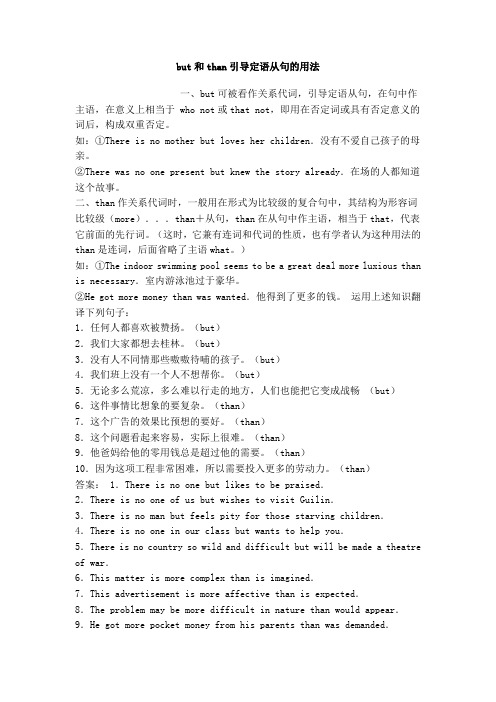
but和than引导定语从句的用法一、but可被看作关系代词,引导定语从句,在句中作主语,在意义上相当于 who not或that not,即用在否定词或具有否定意义的词后,构成双重否定。
如:①There is no mother but loves her children.没有不爱自己孩子的母亲。
②There was no one present but knew the story already.在场的人都知道这个故事。
二、than作关系代词时,一般用在形式为比较级的复合句中,其结构为形容词比较级(more)...than+从句,than在从句中作主语,相当于that,代表它前面的先行词。
(这时,它兼有连词和代词的性质,也有学者认为这种用法的than是连词,后面省略了主语what。
)如:①The indoor swimming pool seems to be a great deal more luxious than is necessary.室内游泳池过于豪华。
②He got more money than was wanted.他得到了更多的钱。
运用上述知识翻译下列句子:1.任何人都喜欢被赞扬。
(but)2.我们大家都想去桂林。
(but)3.没有人不同情那些嗷嗷待哺的孩子。
(but)4.我们班上没有一个人不想帮你。
(but)5.无论多么荒凉,多么难以行走的地方,人们也能把它变成战畅(but)6.这件事情比想象的要复杂。
(than)7.这个广告的效果比预想的要好。
(than)8.这个问题看起来容易,实际上很难。
(than)9.他爸妈给他的零用钱总是超过他的需要。
(than)10.因为这项工程非常困难,所以需要投入更多的劳动力。
(than)答案: 1.There is no one but likes to be praised.2.There is no one of us but wishes to visit Guilin.3.There is no man but feels pity for those starving children.4.There is no one in our class but wants to help you.5.There is no country so wild and difficult but will be made a theatre of war.6.This matter is more complex than is imagined.7.This advertisement is more affective than is expected.8.The problem may be more difficult in nature than would appear.9.He got more pocket money from his parents than was demanded.10.The project requires more labor than has been put in because it is extremely difficult.before 与until在日常的英语学习中,我们遇到before和until时,往往会将二者搞错。
定语从句句式

定语从句句式定语从句定义:在复合句中修饰名词或代词的从句;被修饰的名词或代词叫先行词。
种类:关系代词:who、whom、whose、which、that关系副词:where、when、why准关系代词:as、but、than复合关系代词:what、whatever、whoever、whichever一、关系代词引导的定语从句(1)由who引导的定语从句:1.关系代词who用作主语,指人或动物;2.who;不能用作表语;(2)由who引导的定语从句:1.关系代词whom用作宾语,指人;2.whom不能用作表语;(3)由whose引导的定语从句:1.关系代词whose作定语,既可指人也可指物。
2.whose用于引导定语从句时,有“whose=of which”(4)由which引导的定语从句:1.关系代词做主语、谓语动词或介词的宾语,指物或动物;2.常用关系代词which作表语,既可指人也可指物,“人”要具有某种特性;3.which既能引导限制性定语从句,也能引导非限定性定语从句;(5)由of which/whom引导的定语从句:1.名词、不定代词、数量词+of which/whom2. of which/whom从句中作主语有两种形式:数词、名词+of which/whom 或of which/whom+数词、名词3.“名词+of which”做主语时常用“whose+名词”取代;4.of which所修饰的名词前应加上定冠词;(6)由介词+which+抽象名词引导的定语从句:1.在非限制性定语从句中,以“介词+which+抽象名词”结构补充说明,which作定语;2.the way后接定语有三种形式:不加;加that;加in which;(7)由that引导的定语从句:1.关系代词that在从句中作主语或宾语,不作介词宾语,既指人也指物;2.先行词是不定代词时,必须用that引导定语从句;3.先行词被不定代词修饰时,必须用that引导定语从句;4.先行词被序数词或形容词最高级修饰时,必须用that引导定语从句;5. 先行词既有人又有物时,必须用that引导定语从句;6. 先行词被the only、the same、the last修饰时,必须用that 引导定语从句;7.以who、which引起的问句中,为避免重复,常用that引导定语从句;8.用作关系副词以修饰表示时间的名词时,常用that代替when 引导定语从句;9.构成非限制性定语从句时,不用that;10关系代词前有介词且指物时,不用that;11.先行词本身是that时,不用that;12.关系代词之后有插入成分时,不用that;二、关系副词引导的定语从句(1)由when的定语从句:1.关系副词when是兼有连词作用的副词,常用于表示时间;2.先行词为表示时间的名词;3在口语中,先行词为表示时间的名词时,可以省略when;4先行词在从句中起副词作用作时间状语时,用when引导定语从句;先行词在从句中起代词作用作宾语时,用which/that引导定语从5.在this/that/it’s后可省略先行词the time;6.现代英语口语中,the day when、the time when、the moment when可用that代替;;7.关系副词when可用恰当的“介词+which”代替;(2)由where引导的定语从句:1. 关系副词where是兼有连词作用的副词,常用于表示地点;2.先行词为表地点或有地点含义的抽象名词;3.在口语中,先行词是place、room等词时,可以省略where;4.先行词在从句中起副词作用作地点状语时,用where引导定语从句;先行词在从句中起代词作用作宾语时,用that/which引导定语从句;5. 在this/that/it’s后可省略先行词the place;6. 现代英语口语中,the place where可用the place that代替;7. 关系副词where可用恰当的“介词+which”代替;(3)由why引导的定语从句:1. 关系副词why兼有连词作用的副词,常用于表示原因;2.先行词只有reason;3.在口语中,可以省略why;4.先行词reason在从句中起副词作用表原因时,用why引导定语从句;先行词reason在从句中起代词作用作宾语时,用that/which引导定语从句;5.在this/that/it’s后可省略先行词the reason;6.现代英语口语中,the reason why可用the reason that代替;7. 关系副词why可用恰当的“介词+which”代替;(4)由介词+where/when引导的定语从句:1.from where引导的定语从句中,where代表主句提供的地点;2.since/by when引导的定语从句中,when代表主句提供的时间三、准关系代词引导的定语从句(1)由准关系代词as引导的限制性定语从句:1.as既可作引导状语从句的连词,也可作引导定语从句的关系代词;2.在such…as引导的定语从句中,as在从句中作主语或表语;3.在the same…as引导的定语从句中,as在从句中作主语或宾语;4.在as…as引导的定语从句中,as在从句中作主语;5.区别:such…as引导定语从句,such…that引导结果状语从句;6.区别:the same…as指两物相似,the same…that描述的是同一物;(2)由准关系代词as引导的非限制性定语从句:1.as代表主句或主句一部分的意思,不能指代某个名词或代词;2.在as引导的非限制性定语从句中,as可以放在主句的任意位置,在从句中作主语或宾语;3.主句表否定,as引导的定语从句位于主句之后时,as指代的主句不表否定,可用but代替;4.主句表否定,as引导的定语从句位于主句之前时,as指代的主句仍表否定意义;5非限制性定语从句中,which引导的从句不能放在主句前,as 引导的从句可放在主句前后.;6.非限制性定语从句中,as/which用作关系代词时都可指代一个句子,但as有“就像”之意;7.非限制性定语从句中,当从句的谓语动词时be动词或连系动词时,as/which都可作主语;8.非限制性定语从句中,当从句的谓语动词是行为动词时,只能用which作主语;9.非限制性定语从句中,as可作连词引导状语从句,构成“as+过去分词”形式,表定语义;(3)由准关系代词but引导的定语从句:1.but本身含有否定义,相当于who/which/that…not;2.but的先行词往往是有否定义的代词或名词词组,通过双重否定表强烈肯定;3.but用于定语从句中作主语,此时谓语动词的数要与先行词一致,时态要与主句一致;4.but用于引导状语从句时,有“but=that...not”(4)由准关系代词than引导的定语从句:1.than引导的定语从句中,谓语动词的数和时态必须与被比较级修饰的先行词一致;2.than引导的状语从句中,用作连词的than可兼作关系代词在主句中作主语,than指代主句;3.than引导的状语从句中,构成“than+过去分词”结构,than 后省略了形式主语it、动词be;四、复合关系代词引导的定语从句(1)复合关系代词what引导的定语从句:1.定语从句中,what是由先行词和关系代词组成的复合词,是兼作先行词的关系代词;2.what用于指人时,what=the person that;what用于指物时,what=the thing(s) which;3.what在定语从句中起名词作用时,可作主语、宾语、表语;4.what在定语从句中起形容词作用时,修饰名词,意为“仅有的”;5.what在定语从句中起形容词作用时,常与few、little连用,意为“尽管不多,但已全部”;6.what引导的名词性从句中,无疑问义,可作从句的主语、宾语、介宾、宾补;7.what用于表比喻义的特殊结构:A is to B what C is to D;8.what组成的常用短语:What if…? 如果…怎么样?What of it?那又怎么样?(2)复合关系代词whoever,whomever,whichever,whatever引导的定语从句:1.whoever、whomever、whichever、whatever具有名词功能,引导名词性从句;2.whoever、whomever、whichever、whatever指代未知的人或物,在从句中作主语或宾语;3.whichever、whatever在名词性从句中兼起形容词作用,修饰从句中名词,意为“仅有的”;4. whoever、whichever、whatever在名词性从句中兼起副词作用,引导让步状语从句;五、关系代词的省略1.当关系代词在定语从句中作宾语时往往省略;2.当关系代词在定语从句中作表语时,用that且往往省略;3.当先行词为不定代词时,往往不用关系代词;4.当定语从句为there be句型时,往往不用关系代词;5.当主句为there be句型时,实际主语后若带有定语从句,作主语的关系代词有时省略;六、插入语(1)分句用作插入语:I believe、I find、I hear、I imagine、I remember、I think、I sup pose…(2)状语分句作插入语:1.可作插入语的状语分句有:as far as I know、as I told you before、if you like…2.省略形式的状语分句作插入语:if ever、if possible、if any…(3)what构成的惯用插入语:1.“what+be+比较级形容词”结构,意为“而且,尤有甚者“;2.“what we call,what is called”,意为“所谓的”;3.“what+…”的类似结构:what we consider、what you refer to as、what is referred to as…例句:This is the man who helped me.(who在从句中作主语)The doctor whom you are looking for is in the room.(whom 在从句中作宾语)Do you see the house whose windows are all broken?(whose在从句中作定语)The building which stands near the river is our school.(which在从句中作主语)This is the book (which) you want.(which在从句中作谓语动词的宾语)The room in which there is a machine is a workshop.(which 在从句中作介宾)The war killed 1000 people, most of which were very young.(“不定代词+of which”的形式)The committee consists of 20 members, five of whom are women.(“数量词+of whom”的形式)Do you see the house the windows of which are all broken?(“名词+of which”作主语结构之一)Do you see the house of which the windows are all broken? (“名词+of which”作主语结构之二)It rained all night, during which time the ship broke in pieces.(“介词+which+抽象名词”结构)That’s the way (/) he spoke.(the way后接定语的形式之一)That’s the way that he did it. (the way后接定语的形式之二) That’s the way in which you answered the question. (the way后接定语的形式之三)。
no more than的用法及其他
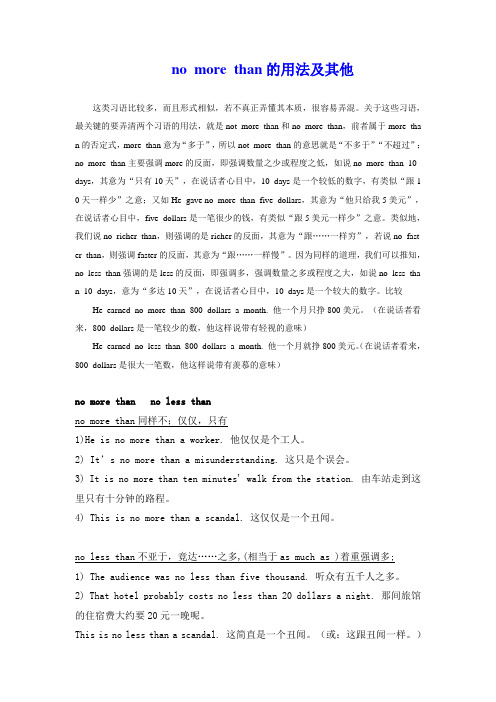
no more than的用法及其他这类习语比较多,而且形式相似,若不真正弄懂其本质,很容易弄混。
关于这些习语,最关键的要弄清两个习语的用法,就是not more than和no more than,前者属于more tha n的否定式,more than意为“多于”,所以not more than的意思就是“不多于”“不超过”;no more than主要强调more的反面,即强调数量之少或程度之低,如说no more than 10 days,其意为“只有10天”,在说话者心目中,10 days是一个较低的数字,有类似“跟1 0天一样少”之意;又如He gave no more than five dollars,其意为“他只给我5美元”,在说话者心目中,five dollars是一笔很少的钱,有类似“跟5美元一样少”之意。
类似地,我们说no richer than,则强调的是richer的反面,其意为“跟……一样穷”,若说no fast er than,则强调faster的反面,其意为“跟……一样慢”。
因为同样的道理,我们可以推知,no less than强调的是less的反面,即强调多,强调数量之多或程度之大,如说no less tha n 10 days,意为“多达10天”,在说话者心目中,10 days是一个较大的数字。
比较He earned no more than 800 dollars a month. 他一个月只挣800美元。
(在说话者看来,800 dollars是一笔较少的数,他这样说带有轻视的意味)He earned no less than 800 dollars a month. 他一个月就挣800美元。
(在说话者看来,800 dollars是很大一笔数,他这样说带有羡慕的意味)no more than no less thanno more than同样不;仅仅,只有1)He is no more than a worker. 他仅仅是个工人。
than引导的定语从句和状语从句
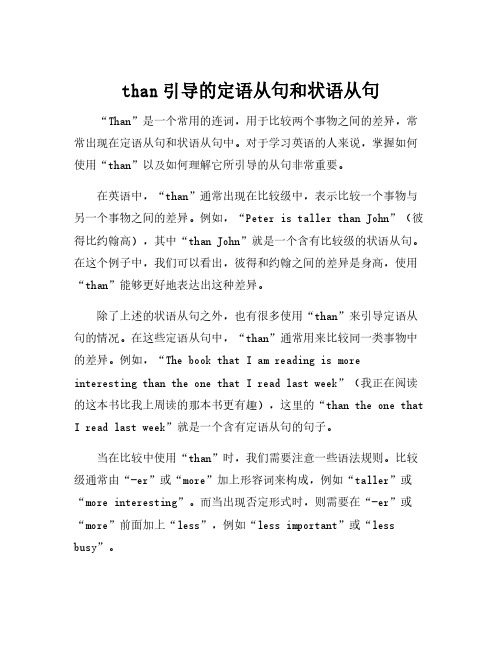
than引导的定语从句和状语从句“Than”是一个常用的连词,用于比较两个事物之间的差异,常常出现在定语从句和状语从句中。
对于学习英语的人来说,掌握如何使用“than”以及如何理解它所引导的从句非常重要。
在英语中,“than”通常出现在比较级中,表示比较一个事物与另一个事物之间的差异。
例如,“Peter is taller than John”(彼得比约翰高),其中“than John”就是一个含有比较级的状语从句。
在这个例子中,我们可以看出,彼得和约翰之间的差异是身高,使用“than”能够更好地表达出这种差异。
除了上述的状语从句之外,也有很多使用“than”来引导定语从句的情况。
在这些定语从句中,“than”通常用来比较同一类事物中的差异。
例如,“The book that I am reading is moreinteresting than the one that I read last week”(我正在阅读的这本书比我上周读的那本书更有趣),这里的“than the one that I read last week”就是一个含有定语从句的句子。
当在比较中使用“than”时,我们需要注意一些语法规则。
比较级通常由“-er”或“more”加上形容词来构成,例如“taller”或“more interesting”。
而当出现否定形式时,则需要在“-er”或“more”前面加上“less”,例如“less important”或“less busy”。
此外,我们还需要注意“than”所引导的从句中应该使用正确的主谓一致形式。
例如,“The athletes run faster than the spectators”(这些运动员跑得比观众快),这里的“run”是运动员的动词,而不是观众的动词。
总之,掌握“than”引导的定语从句和状语从句非常重要,可以帮助我们更好地表达比较和差异。
同时,需要注意语法规则和主谓一致形式,以避免语法错误。
but和than 定语从句
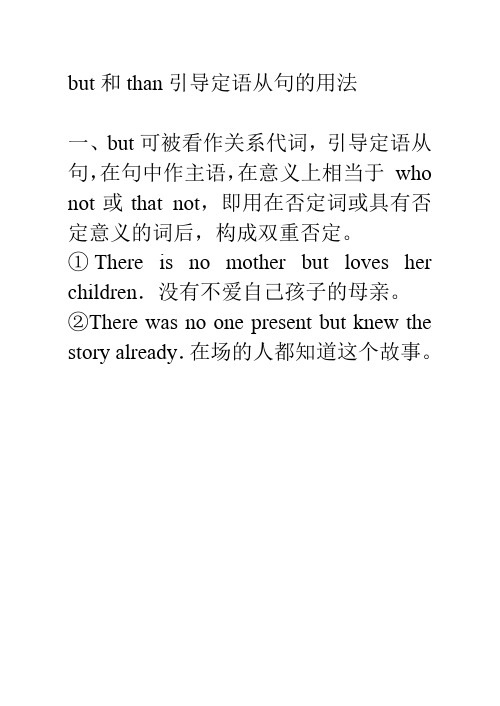
but和than引导定语从句的用法一、but可被看作关系代词,引导定语从句,在句中作主语,在意义上相当于who not或that not,即用在否定词或具有否定意义的词后,构成双重否定。
①There is no mother but loves her children.没有不爱自己孩子的母亲。
②There was no one present but knew the story already.在场的人都知道这个故事。
二、than作关系代词时,一般用在形式为比较级的复合句中,其结构为形容词比较级(more)...than+从句,than在从句中作主语,相当于that,代表它前面的先行词。
这时,它兼有连词和代词的性质①The indoor swimming pool seems to bea great deal more luxurious than is necessary.室内游泳池过于豪华。
②He got more money than was wanted.他得到了更多的钱。
运用上述知识翻译下列句子:1.任何人都喜欢被赞扬。
(but)2.我们大家都想去桂林。
(but)3.没有人不同情那些贫困的孩子。
(but)4.我们班上没有一个人不想帮你。
(but)5.这件事情比想象的要复杂。
(than)6.这个广告的效果比预想的要好。
(than)7.这个问题看起来容易,实际上很难。
(than)8.他爸妈给他的零用钱总是超过他的需要。
(than)答案:1.There is no one but likes to be praised.2.There is no one of us but wishes to visit Guilin.3.There is no man but feels pity for those poor children.4.There is no one in our class but wants to help you.5.This matter is more complex/ complicated than is imagined.6.This advertisement is more affective than is expected.7.The problem may be more difficult in nature than would appear.8.He got more pocket money from his parents than was demanded.5.无论多么荒凉,多么难以行走的地方,人们也能把它变成战场?(but)5.There is no country so wild and difficult but will be made a theatre of war.。
英语单项选择题
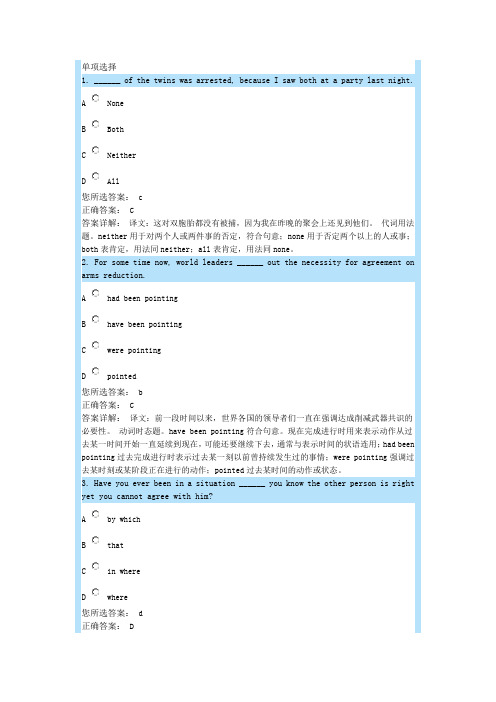
A NoneB BothC NeitherD All您所选答案:A had been pointingB have been pointingC were pointingD pointed您所选答案:A by whichB thatC in whereD where您所选答案:A whichB whatC thatD they您所选答案:A beingB to beC to have beenD having been您所选答案:A how little moneyB so little moneyC such little moneyD what little money 您所选答案:A whoB asC thatD like您所选答案:A have bben put inB being put inC has been put inD to be put in您所选答案:A Had it not beenB Hadn't it beenC Was it notD Were it not 您所选答案:A I'd decideB I decidedC I decideD I'm deciding 您所选答案:A awardB compensationC prizeD reward您所选答案:A onlyB quiteC narrowlyD seldom您所选答案:A unjustifiedB unjustC misguidedD unaccepted 您所选答案:A promisingB agreeingC pleasingD obliging您所选答案:A applicationB bidC proposalD suggestion 您所选答案:A indicativeB positiveC revealingD evident您所选答案:A regretfulB regrettableC regrettingD regretted 您所选答案:正确答案: B答案详解:译文:令人遗憾的是,工会和管理层之间缺乏沟通。
but和than引导的定语从句
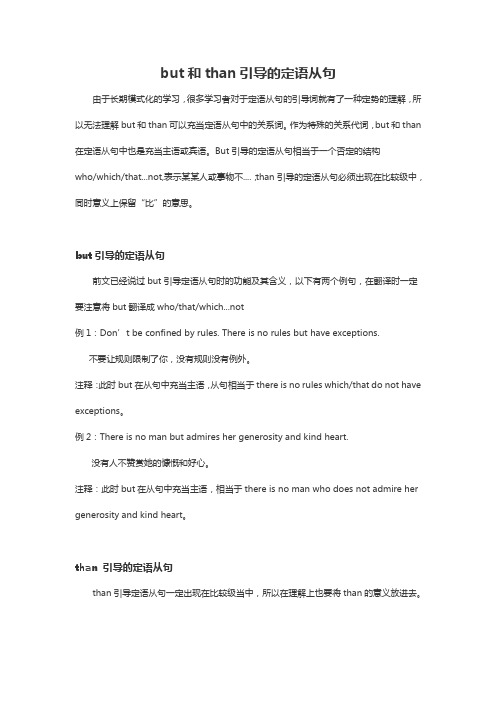
but和than引导的定语从句由于长期模式化的学习,很多学习者对于定语从句的引导词就有了一种定势的理解,所以无法理解but和than可以充当定语从句中的关系词。
作为特殊的关系代词,but和than 在定语从句中也是充当主语或宾语。
But引导的定语从句相当于一个否定的结构who/which/that...not,表示某某人或事物不....;than引导的定语从句必须出现在比较级中,同时意义上保留“比”的意思。
but引导的定语从句前文已经说过but引导定语从句时的功能及其含义,以下有两个例句,在翻译时一定要注意将but翻译成who/that/which...not例1:Don’t be confined by rules. There is no rules but have exceptions.不要让规则限制了你,没有规则没有例外。
注释:此时but在从句中充当主语,从句相当于there is no rules which/that do not have exceptions。
例2:There is no man but admires her generosity and kind heart.没有人不赞赏她的慷慨和好心。
注释:此时but在从句中充当主语,相当于there is no man who does not admire her generosity and kind heart。
than 引导的定语从句than引导定语从句一定出现在比较级当中,所以在理解上也要将than的意义放进去。
例1:Children today are likely to have less supervision at home than was common in the traditional family structure. (此时than在句中充当主语)与传统家庭结构相比,现代家庭结构中的孩子受到的管教表少了。
定语从句特殊用法
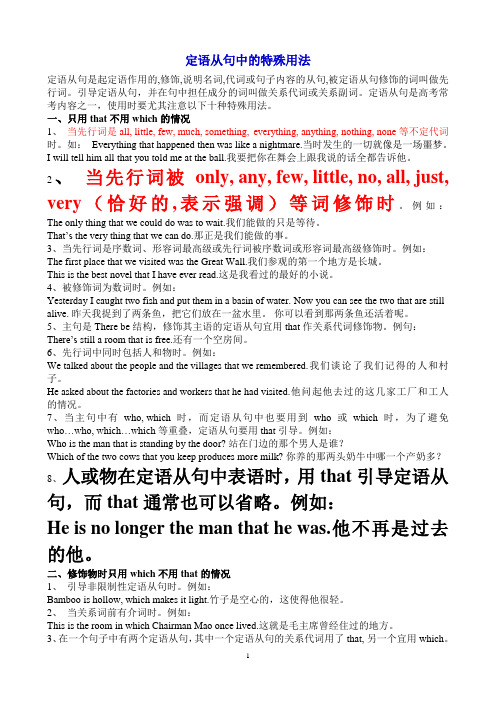
定语从句中的特殊用法定语从句是起定语作用的,修饰,说明名词,代词或句子内容的从句,被定语从句修饰的词叫做先行词。
引导定语从句,并在句中担任成分的词叫做关系代词或关系副词。
定语从句是高考常考内容之一,使用时要尤其注意以下十种特殊用法。
一、只用that不用which的情况1、当先行词是all, little, few, much, something, everything, anything, nothing, none等不定代词时。
如:Everything that happened then was like a nightmare.当时发生的一切就像是一场噩梦。
I will tell him all that you told me at the ball.我要把你在舞会上跟我说的话全都告诉他。
2、当先行词被only, any, few, little, no, all, just, very(恰好的,表示强调)等词修饰时。
例如:The only thing that we could do was to wait.我们能做的只是等待。
That’s the very thing that we can do.那正是我们能做的事。
3、当先行词是序数词、形容词最高级或先行词被序数词或形容词最高级修饰时。
例如:The first place that we visited was the Great Wall.我们参观的第一个地方是长城。
This is the best novel that I have ever read.这是我看过的最好的小说。
4、被修饰词为数词时。
例如:Yesterday I caught two fish and put them in a basin of water. Now you can see the two that are still alive. 昨天我捉到了两条鱼,把它们放在一盆水里。
Than 的难点用法解析
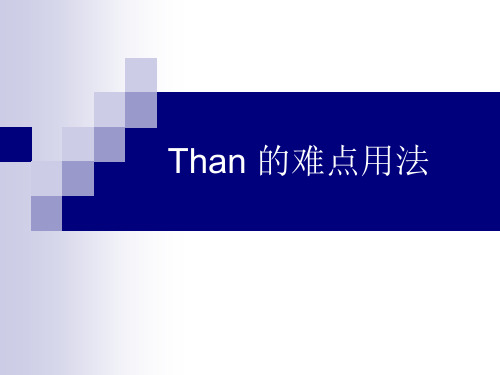
五、引导比较状语从句且在从句中充当成分 有时可引导一个从句并在从句中充当句子成 分(主语、宾语、表语),为便于理解,有时 可视为than后省略了what (但实际上这个 what通常不宜补上,除非在英国某些方言 里),但也有人认为在一些类似情况下than有 点像关系代词,引导一个类似于定语从句的 句子(但又不完全像定语从句,因为有时其前 没有先行词),这类省略句通常不能补上所缺 的主语或宾语(,这类省略句通常不能补上所 缺因为than就充当了主语和宾语)。
(2) “not +比较级+than”的意思是“不 比……更”“不如”。如: He is not richer than you. 他不如你富有。 This one is not better than that one. 这 个不如那个好。
二、后接动词用不定式还是-ing分词 1. 当连接两个非谓语动词时,通常应使用 一样的形式。如: It is much easier to get into debt than to get out of it. 借债容易还债难。 He likes playing chess more than watching TV. 与看电视相比,他更喜欢下 棋。
七、同质比较还是异质比较 than 通常用于两个不同的人或物在同一方面 进行比较,但有时指的可能是同一个人或物在 两个不同的方面进行比较,此时只用于 more…than…结构,而不能用 –er…than… 的形式(即使是单音节也是如此),这类结构通 常可译为“与其……不如……”“有…… 无……”。 He’s more fat than short. 与其说他矮不如说 他胖。 They are more brave than wise. 他们有勇 无谋。
2016考研英语:定语从句中的特殊关系词
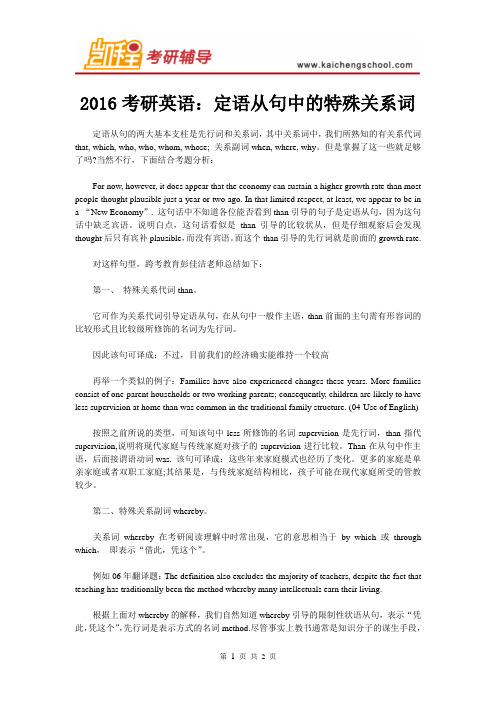
2016考研英语:定语从句中的特殊关系词定语从句的两大基本支柱是先行词和关系词,其中关系词中,我们所熟知的有关系代词that, which, who, who, whom, whose; 关系副词when, where, why。
但是掌握了这一些就足够了吗?当然不行,下面结合考题分析:For now, however, it does appear that the economy can sustain a higher growth rate than most people thought plausible just a year or two ago. In that limited respect, at least, we appear to be in a “New Economy”. 这句话中不知道各位能否看到than引导的句子是定语从句,因为这句话中缺乏宾语。
说明白点,这句话看似是than引导的比较状从,但是仔细观察后会发现thought后只有宾补plausible,而没有宾语。
而这个than引导的先行词就是前面的growth rate.对这样句型,跨考教育彭佳洁老师总结如下:第一、特殊关系代词than。
它可作为关系代词引导定语从句,在从句中一般作主语,than前面的主句需有形容词的比较形式且比较级所修饰的名词为先行词。
因此该句可译成:不过,目前我们的经济确实能维持一个较高再举一个类似的例子:Families have also experienced changes these years. More families consist of one-parent households or two working parents; consequently, children are likely to have less supervision at home than was common in the traditional family structure. (04-Use of English)按照之前所说的类型,可知该句中less所修饰的名词supervision是先行词,than指代supervision,说明将现代家庭与传统家庭对孩子的supervision进行比较。
Than的用法
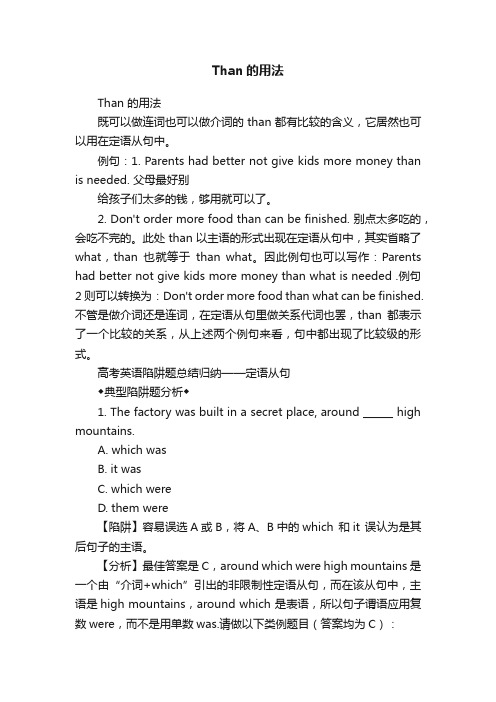
Than的用法Than 的用法既可以做连词也可以做介词的than都有比较的含义,它居然也可以用在定语从句中。
例句:1. Parents had better not give kids more money than is needed. 父母最好别给孩子们太多的钱,够用就可以了。
2. Don't order more food than can be finished. 别点太多吃的,会吃不完的。
此处than以主语的形式出现在定语从句中,其实省略了what,than也就等于than what。
因此例句也可以写作:Parents had better not give kids more money than what is needed .例句2则可以转换为:Don't order more food than what can be finished. 不管是做介词还是连词,在定语从句里做关系代词也罢,than都表示了一个比较的关系,从上述两个例句来看,句中都出现了比较级的形式。
高考英语陷阱题总结归纳——定语从句◆典型陷阱题分析◆1. The factory was built in a secret place, around ______ high mountains.A. which wasB. it wasC. which wereD. them were【陷阱】容易误选A或B,将A、B中的which 和it 误认为是其后句子的主语。
【分析】最佳答案是C,around which were high mountains 是一个由“介词+which”引出的非限制性定语从句,而在该从句中,主语是high mountains,around which 是表语,所以句子谓语应用复数were,而不是用单数was.请做以下类例题目(答案均为C):(1)Yesterday we visited a modern hospital, around _______ some fruit shops.A. which isB. it isC. which areD. them are(2)The murder happened in an old building, beside ______ the city police station.A. which areB. it isC. which isD. them are(3)Next month we’ll move to a new building, next to _______ a nice restaurants where we can have Chinese food.A. which areB. it isC. which isD. them are2. A man with a bleeding hand hurried in and asked, “Is there a hospital around ______ I can get some medicine for my wounded hand?”A. thatB. whichC. whereD. what【陷阱】容易误选B,认为around 是介词,选which 用以代替前面的名词hospital,在此用作介词around 的宾语。
than引导定语从句
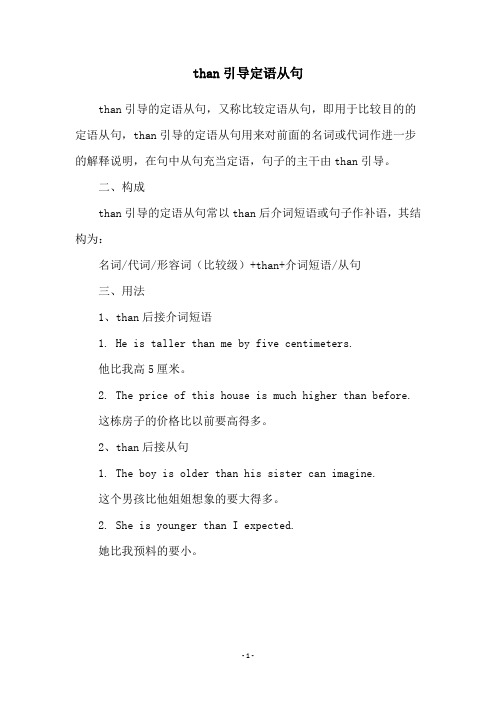
than引导定语从句
than引导的定语从句,又称比较定语从句,即用于比较目的的定语从句,than引导的定语从句用来对前面的名词或代词作进一步的解释说明,在句中从句充当定语,句子的主干由than引导。
二、构成
than引导的定语从句常以than后介词短语或句子作补语,其结构为:
名词/代词/形容词(比较级)+than+介词短语/从句
三、用法
1、than后接介词短语
1. He is taller than me by five centimeters.
他比我高5厘米。
2. The price of this house is much higher than before.
这栋房子的价格比以前要高得多。
2、than后接从句
1. The boy is older than his sister can imagine.
这个男孩比他姐姐想象的要大得多。
2. She is younger than I expected.
她比我预料的要小。
- 1 -。
30天长难句之每日一句
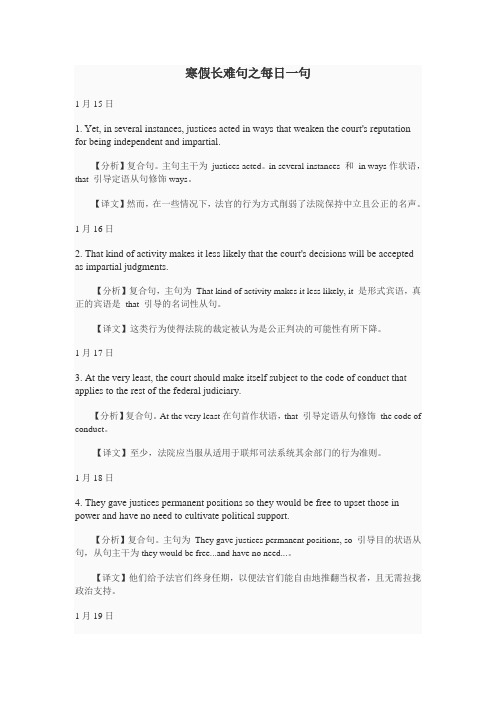
寒假长难句之每日一句1月15日1. Yet, in several instances, justices acted in ways that weaken the court's reputation for being independent and impartial.【分析】复合句。
主句主干为justices acted。
in several instances 和in ways作状语,that 引导定语从句修饰ways。
【译文】然而,在一些情况下,法官的行为方式削弱了法院保持中立且公正的名声。
1月16日2. That kind of activity makes it less likely that the court's decisions will be accepted as impartial judgments.【分析】复合句,主句为That kind of activity makes it less likely, it 是形式宾语,真正的宾语是that 引导的名词性从句。
【译文】这类行为使得法院的裁定被认为是公正判决的可能性有所下降。
1月17日3. At the very least, the court should make itself subject to the code of conduct that applies to the rest of the federal judiciary.【分析】复合句。
At the very least在句首作状语,that 引导定语从句修饰the code of conduct。
【译文】至少,法院应当服从适用于联邦司法系统其余部门的行为准则。
1月18日4. They gave justices permanent positions so they would be free to upset those in power and have no need to cultivate political support.【分析】复合句。
but和than引导的定语从句
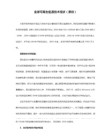
在初级英语阶段,学生知道引导定语从句的关系代词有who (whom, whose),that和which等。到了中高级阶段,这些显然是不够的。还应了解but和than也可以用作关系代词的情况,以拓宽知识面,提高语言识别和理解能力。
1.but在英语句子中可用作关系代词,引导定语从句。但应特别注意but虽然形式上是肯定的,意义上却是否定的。这正是but和其它关系代词(who, that , which等)不同之处。例如:
(12)To understand the situation completely requires more thought than has been given thus far.要彻底理解这种局势需要作比迄今为止更多的思考。
如果我们仔细观察一下,就会发现,例句(9)中的名词cigarettes用的是复数形式,所以从句就用了复数形式的动词were,而在例句(10)、(11)和(12)中由于所用从句中便分别用了单数形式的动词is、was以及has been given。由此可以证明,以上各例句中的than从语法功能来看是关系代词,所引导的从句是定语从句,而不是连接词引导的状语从句。
(9)He smoked more (fewer) cigarettes than (he bought.) were normally available.他吸的香烟比他买的(弄到的)要多(少)。这里than在语法功能上相当于that/which的功能,但是这里不能改成后者,因为主句中有比较级more。
(1)There is no rule in English but has exceptions.英语中没有无例外的规则。
(2)There is no old habit but may be cured by a strong will-power.通过强大的意志力没有改不了的旧习惯。
关于than的一些用法
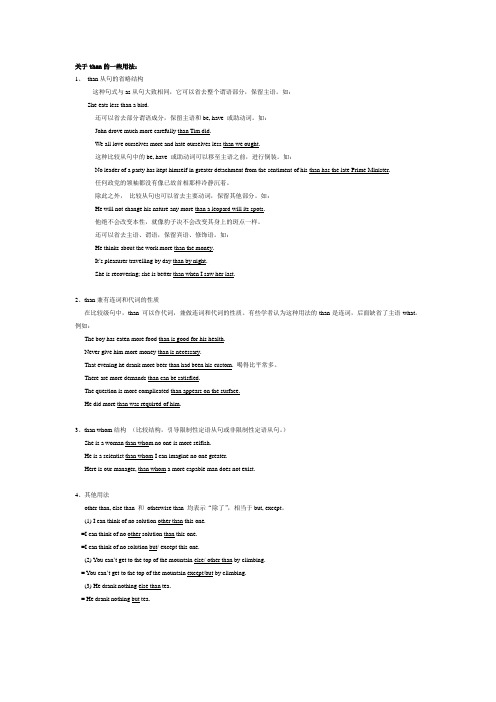
关于than的一些用法:1、than从句的省略结构这种句式与as从句大致相同,它可以省去整个谓语部分,保留主语。
如:She eats less than a bird.还可以省去部分谓语成分,保留主语和be, have 或助动词。
如:John drove much more carefully than Tim did.We all love ourselves more and hate ourselves less than we ought.这种比较从句中的be, have 或助动词可以移至主语之前,进行倒装。
如:No leader of a party has kept himself in greater detachment from the sentiment of his than has the late Prime Minister.任何政党的领袖都没有像已故首相那样冷静沉着。
除此之外,比较从句也可以省去主要动词,保留其他部分。
如:He will not change his nature any more than a leopard will its spots.他绝不会改变本性,就像豹子决不会改变其身上的斑点一样。
还可以省去主语、谓语,保留宾语、修饰语。
如:He thinks about the work more than the money.It’s pleasurer travelling by day than by night.She is recovering; she is better than when I saw her last.2、than兼有连词和代词的性质在比较级句中,than 可以作代词,兼做连词和代词的性质。
有些学者认为这种用法的than是连词,后面缺省了主语what。
例如:The boy has eaten more food than is good for his health.Never give him more money than is necessary.That evening he drank more beer than had been his custom. 喝得比平常多。
as,but引导定语从句
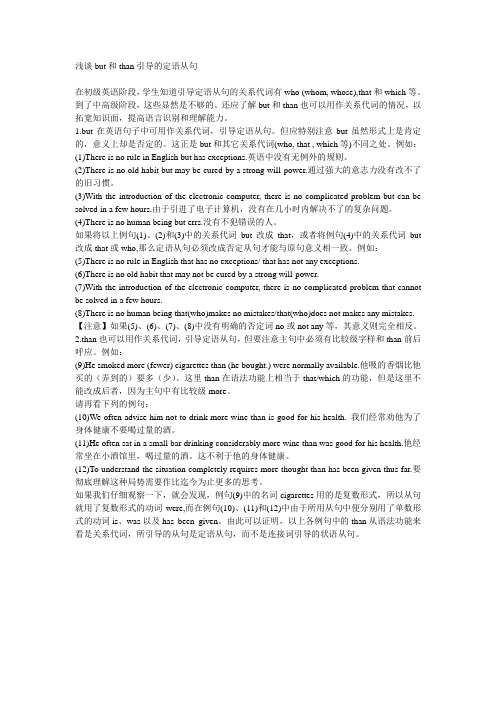
浅谈but和than引导的定语从句在初级英语阶段,学生知道引导定语从句的关系代词有who (whom, whose),that和which等。
到了中高级阶段,这些显然是不够的。
还应了解but和than也可以用作关系代词的情况,以拓宽知识面,提高语言识别和理解能力。
1.but在英语句子中可用作关系代词,引导定语从句。
但应特别注意but虽然形式上是肯定的,意义上却是否定的。
这正是but和其它关系代词(who, that , which等)不同之处。
例如:(1)There is no rule in English but has exceptions.英语中没有无例外的规则。
(2)There is no old habit but may be cured by a strong will-power.通过强大的意志力没有改不了的旧习惯。
(3)With the introduction of the electronic computer, there is no complicated problem but can be solved in a few hours.由于引进了电子计算机,没有在几小时内解决不了的复杂问题。
(4)There is no human being but errs.没有不犯错误的人。
如果将以上例句(1)、(2)和(3)中的关系代词but改成that,或者将例句(4)中的关系代词but 改成that或who,那么定语从句必须改成否定从句才能与原句意义相一致。
例如:(5)There is no rule in English that has no exceptions/ that has not any exceptions.(6)There is no old habit that may not be cured by a strong will-power.(7)With the introduction of the electronic computer, there is no complicated problem that cannot be solved in a few hours.(8)There is no human being that(who)makes no mistakes/that(who)does not makes any mistakes. 【注意】如果(5)、(6)、(7)、(8)中没有明确的否定词no或not any等,其意义则完全相反。
定语从句中that,as, but ,than
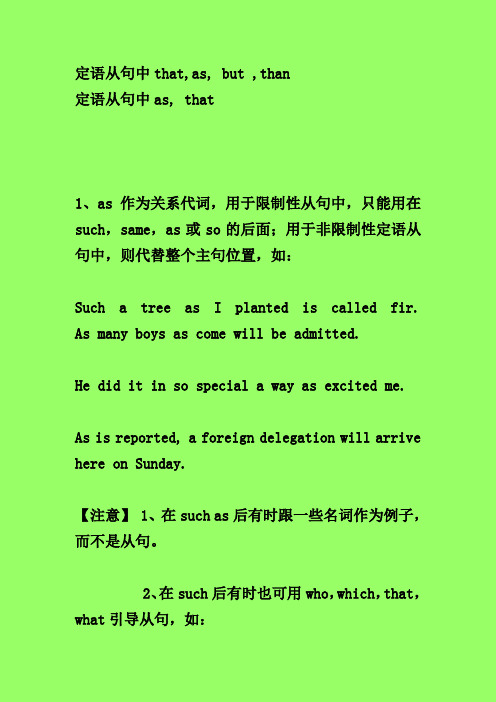
定语从句中that,as, but ,than定语从句中as, that1、as 作为关系代词,用于限制性从句中,只能用在such,same,as或so的后面;用于非限制性定语从句中,则代替整个主句位置,如:Such a tree as I planted is called fir. As many boys as come will be admitted.He did it in so special a way as excited me.As is reported, a foreign delegation will arrivehere on Sunday.【注意】 1、在such as后有时跟一些名词作为例子,而不是从句。
2、在such后有时也可用who,which,that,what引导从句,如:He is such a man that I never wantto know.3、the same as与the same that的区别:The same as表示表示与从句中的内容“相似”,the same that表示与从句中的内容是“同一”。
注意:当先行词由the same修饰时,偶尔也用that引导定语从句,但是和由as 所引导的定语从句意思不同She wore the same dress that she wore at Mary's wedding. 她穿着她在Mary婚礼上穿过的一条裙子。
She wore the same dress as her young sister wore.她穿着和她妹妹所穿的一样的裙子。
2、but 表“不”的意思,不太常用,表示“that/who/whom…not”的意思,引导限制性从句,常用在否定句中,如:There is no one but knows him. (= Everyone knows him.)3、than 作为关系代词,只和形容词、副词的比较级一起用,如:He has more books than is necessary. I stayed longer than is demanded by my boss.(【难点分析】(一)限制性定语从句只能用that 的几种情况1.当先行词是anything, everything, nothing, something , few, all, none, little, some 等代词时,或者是由every, any, all, some, no, little, few, much 等修饰时(1) Have you taken down everything that Mr. Li has said?(2) There seems to be nothing that seems impossible for him in the world.(3) All that can be done has been done.(4) There is little that I can do for you.【注意】 Any man that/who has a sense of duty won't do such a thing. That is all that I have to say.2. 当先行词被序数词修饰(1) The first place that they visited in London was the Big Ben.3. 当先行词被形容词最高级修饰时(1) This is the best film that I have seen.4. 当形容词被the very, the only修饰时(1) This is the very dictionary that I want to buy,(2) After the fire in his house, the old car is the only thing that he owned.当先行词指人时,偶尔也可以用who:(3) Wang Hua is the only person in our school who will attend the meeting/5. 当先行词前面有who, which等疑问代词时(1) Who is the man that is standing there?(2) Which is the T-shirt that fits me most?6. 当先行词既有人,也有动物或者物体时(1) Can you remember the scientist and his theory that we have learned?7、that常和以-ible和-able结尾的词一起用,如:There is no plan that is impossible. There is no road that is impassable.不能用that的几种情况:1、关系代词与它的动词若被隔开时,不能用that,而要用who,which等:I am ready to help any man who, in case he is in trouble, needs my help.2、在介词后面不可用that来代替物,可把介词放在从句的句末用that,也可省略:Here is the novel about which I told you. Here is the novel (that) I told you about.关系代词as和which 引导的定语从句as和which引导非限制性定语从句,有相同之处也有不同之处。
英语语法-从属分句
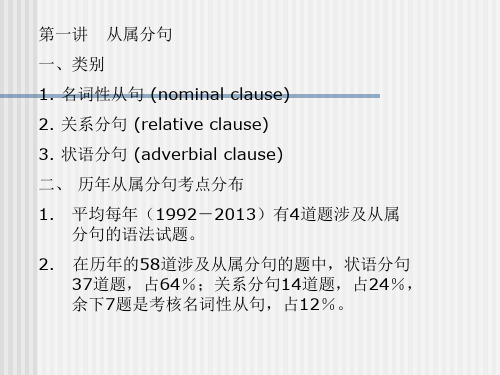
John is not better than Tom.
约翰没有汤姆人好。 而句型“no+比较级+than”则意为“和……一样不”,含 义为“两者都不……”, 如: John is no better than Tom. 约翰和汤姆一样坏。
真题举例及分析
例1 Fat cannot change into muscle ___ muscle changes into fat. (99)
a. any more than
c. no less than
b. no more than
d. much more than
Key: a 考点:句型 “not…any more than”, 意为“……和 …… 同样都 不……”。
相似的句型“not /no…any more than…”意为“…… 和……同样都不”,如:
You can not change their nature any more than you can make leopards change their spots. 你无法改变他们的本性,就像你无法让豹子去掉身上的斑 点一样。 no more/less than v.s. not more/less than no more/less than “只不过/不亚于”,not more/less than “不多于/不少于”前者强调“少或多”, 后者则无强调“多或少、程度强弱”之意。如:
Key: a 考点:比较级从句结构“倍数+the size/speed…of
e.g. The jet can fly twice the speed of sound. 例5 That trumpet player was certainly loud. But I wasn’t bothered by his loudness ___ by his lack of talent. (04) a. so much as b. rather than
高考英语语法:than后的省略
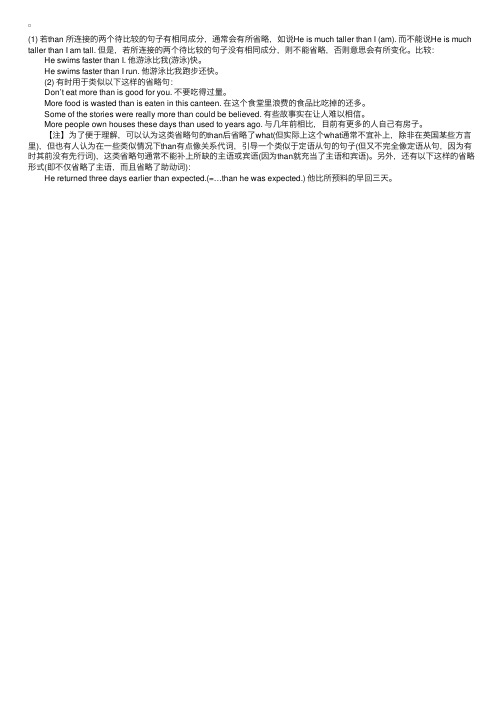
(1) 若than 所连接的两个待⽐较的句⼦有相同成分,通常会有所省略,如说He is much taller than I (am). ⽽不能说He is much taller than I am tall. 但是,若所连接的两个待⽐较的句⼦没有相同成分,则不能省略,否则意思会有所变化。
⽐较: He swims faster than I. 他游泳⽐我(游泳)快。
He swims faster than I run. 他游泳⽐我跑步还快。
(2) 有时⽤于类似以下这样的省略句: Don’t eat more than is good for you. 不要吃得过量。
More food is wasted than is eaten in this canteen. 在这个⾷堂⾥浪费的⾷品⽐吃掉的还多。
Some of the stories were really more than could be believed. 有些故事实在让⼈难以相信。
More people own houses these days than used to years ago. 与⼏年前相⽐,⽬前有更多的⼈⾃⼰有房⼦。
【注】为了便于理解,可以认为这类省略句的than后省略了what(但实际上这个what通常不宜补上,除⾮在英国某些⽅⾔⾥),但也有⼈认为在⼀些类似情况下than有点像关系代词,引导⼀个类似于定语从句的句⼦(但⼜不完全像定语从句,因为有时其前没有先⾏词),这类省略句通常不能补上所缺的主语或宾语(因为than就充当了主语和宾语)。
另外,还有以下这样的省略形式(即不仅省略了主语,⽽且省略了助动词): He returned three days earlier than expected.(=…than he was expected.) 他⽐所预料的早回三天。
- 1、下载文档前请自行甄别文档内容的完整性,平台不提供额外的编辑、内容补充、找答案等附加服务。
- 2、"仅部分预览"的文档,不可在线预览部分如存在完整性等问题,可反馈申请退款(可完整预览的文档不适用该条件!)。
- 3、如文档侵犯您的权益,请联系客服反馈,我们会尽快为您处理(人工客服工作时间:9:00-18:30)。
• 越来越多的家庭是单亲家庭,或者父母双 方都工作。因此,这些家庭里的孩子们相 比于传统家庭结构中的孩子们得到的监管 就会少。
• 别点太多的食物,吃不完的。
• Don’t order more food than can be finished by us. • 别喝太多的酒。不好。
• Don’t drink more wine that is good for you. • 别买太多的衣服,没必要。 • Don’t buy more clothing than is necessary.
than 引导定语 从句
• 1.这件事情比想象的要复杂。(than) • This matter is more complex than was thought. • 2.结果比预想的要好。(than)
• The result is better than was expected.
.
ቤተ መጻሕፍቲ ባይዱ
• 3.他爸妈给他的零用钱总是超过他的需要。 (than)
• More families consist of one parent or two working parents; consequently, children are likely to have less supervision (监管)at home ____ was common in the traditional family structure . • A.than B.that C.which D.as
• His parents gave him more pocket money than was demanded by him.
• 4. 这项工程需要投入比现有的更多的劳 动力(than) • The project requires more labor than has been present
